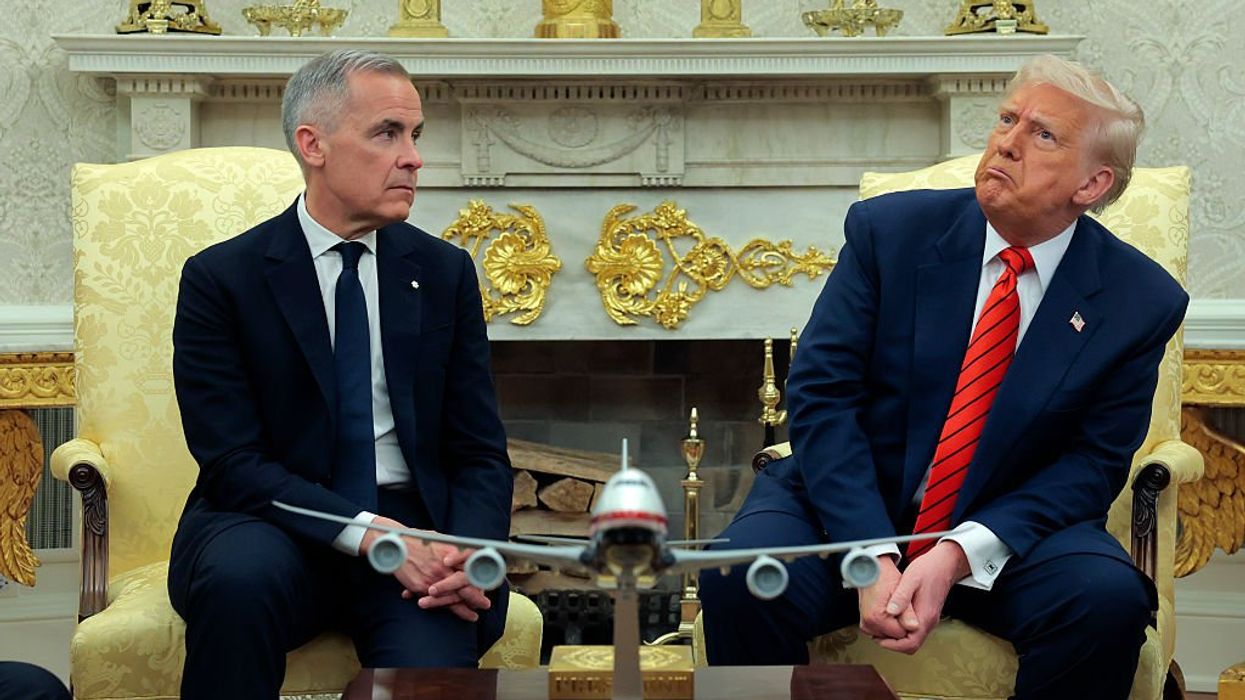Defense Secretary Pete Hegseth’s May 31 speech at the Shangri-La Dialogue defense summit in Singapore was no ordinary one. He accused China of posing a “real” and “imminent” threat, leading China to accuse the United States of touting a “Cold War mentality.” Juxtapose this with King Charles’ May 27 speech opening the Canadian Parliament, which he was prompted to deliver in response to U.S. threats to annex Canada. Consistency has not been a hallmark of this administration, but the mixed messages are not just embarrassing—they’re dangerous.
Given Trump’s unpredictable tariffs and his threats to make Canada the 51st U.S. state, Canada can no longer rely on its continental neighbor as a trusted partner in trade and defense. Canadians are rallying around the hockey saying “elbows up” and preparing to defend themselves politically and economically. Trump’s words, which he doubled down on after the King’s speech, are destroying vital U.S. relationships and making the world—including the United States—less safe. Hegseth’s message to China rings hollow next to Trump’s refusal to treat territorial borders as subject to change only by consent, not coercion or conquest.
To understand why Trump’s rhetoric is so dangerous, think back 80 years to the signing of the Charter of the United Nations. World War II was the world’s deadliest conflict, killing an estimated 70–85 million people, including over 400,000 U.S. soldiers. Between 50–55 million civilians died. Countries created the United Nations and agreed in a binding treaty that they would not use the threat or use of force against any other state’s “territorial integrity or political independence, or in any manner inconsistent with the Purposes of the United Nations.” This is the cardinal principle of post-war international relations, and it has—so far—prevented another world war.
The United States made this bargain in its own self-interest. Without minimizing the political and economic instability Americans have faced in recent decades, the situation would be immeasurably worse if we lived in a world of all-out global military conflict. Yet that is where the Trump administration’s rhetoric is taking us, even though Trump claims to be “anti-war.”
The United States and Canada share the world’s longest land border, which has been conflict-free for over 200 years. Yet Trump has called this border an “artificial line.” He has insinuated that Canada would be better off joining the United States. And looming over his conversation with Prime Minister Mark Carney in the White House was a not-so-veiled threat of making Canada a Godfather-like “offer it can’t refuse.” Before January 2025, the idea that the United States would threaten Canada was imaginable only in South Park, where characters sing about “form[ing] a full assault!” on Canada, dismissing it as “not even a real country anyway!”
Canada is only the latest target. Trump has touted the possibility of annexing Greenland and the Panama Canal. His suggestion that Russia could gain territory in a peace deal with Ukraine has undermined Ukraine’s self-defense and panicked European allies, who know that rewarding Russia’s attack would encourage future land grabs. And Trump has threatened to turn America’s back on the United Nations entirely.
This leaves a global invitation to other aggressive moves, for example in Taiwan, notwithstanding Hegseth’s admonition of China. This might seem like a far-away conflict but it affects Americans deeply. In addition to valuing Taiwanese democracy, Americans rely on Taiwan to produce the world’s most advanced computer chips, which we all use daily. Moreover, as World War II showed, military conflict sparked by territorial ambitions is not easily contained.
Talking about borders as “artificial” gives military hawks around the world tacit permission to disregard the lines that protect each country’s territory and the people who live within them. Annexing any other country’s territory without the clear and uncoerced consent of the population—and even talking about doing so—makes Americans less, not more, secure.
Trump’s South Park diplomacy is destructive and should be rejected. Congress can and should take steps to show the world that Trump does not represent the views of the American people. China has long accused the United States of “double standards”—Trump’s annexationist rhetoric adds fuel to such accusations and increases global instability.
The post-war years have seen Congress cede much of its foreign relations authority to the President in practice, but the Constitution gives Congress an essential role. There are multiple ways for Congress to make its views known. For example, in 2023, Congress passed legislation introduced by Senator Tim Kaine (D-VA) and then-Senator Marco Rubio (R-FL) attempting to prevent any president from withdrawing from NATO without Congress’s consent. During Trump’s first term, congressional Republicans cooperated with Democrats to protect spending on U.S. foreign policy, including the State Department. They should do so again. Individual members of Congress can issue statements with their foreign counterparts, as Senator Lisa Murkowski (R-AK) did in her capacity as a member of the Standing Committee of Parliamentarians of the Arctic Region, emphasizing that “the future will be defined by partnership, not ownership,” and that other countries are “[o]pen for business, but not for sale.” After Carney’s White House visit, several U.S. senators visited Canada to try and stabilize the U.S.–Canada relationship. That’s a good start, but it’s not enough.
Although it’s difficult to imagine a bipartisan resolution recommitting to the principles of the U.N. Charter as we mark the 80th anniversary of that treaty’s signing, such a move would help restore the world’s badly shaken confidence in the United States, a country that—under presidents of both parties—could previously be counted upon to support our allies and respect their borders, just as we insist that other countries respect ours.
Chimène Keitner is a professor of law at the University of California, Davis School of Law, a PD Soros Fellow, and a Public Voices Fellow of The OpEd Project. She previously served as Counselor on International Law at the U.S. Department of State.




















Trump & Hegseth gave Mark Kelly a huge 2028 gift